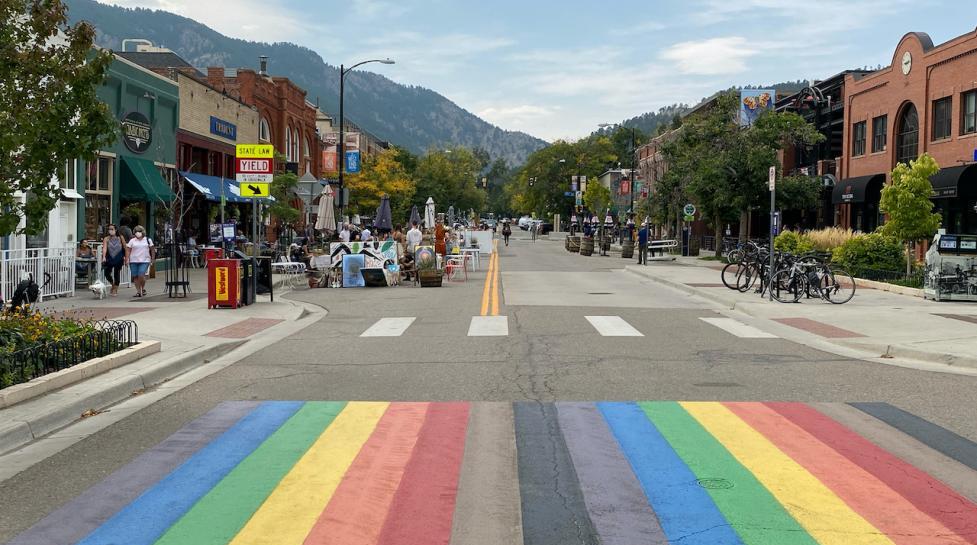Celebrating the LGBTQ+ community's history in Boulder and the city's commitment to protecting all community members against discrimination.
The City of Boulder is committed to celebrating and ensuring the fair treatment of all community members, including our lesbian, gay, bisexual, transgender and queer (LGBTQ+) residents, workers, visitors and students.
Boulder has a diverse LGBTQ+ community that includes people of many ethnicities, religions, and professions, and we consider diversity to be a community asset that enhances and enriches the lives of every resident, worker, visitor, and student in our city. Find information and helpful resources for and by LGBTQ+ communities on the city’s website.
Over 50 Years of LGBTQ+ History in Boulder
In the early 1970s, national movements and the city's progressive atmosphere laid the foundation for the emergence of local LGBTQ+ organizations and events. Local activists and community members began organizing gatherings and discussions, providing safe spaces for individuals to explore and express their identities.
Notable milestones in the LGBTQ+ movement in Boulder include:
- Boulder’s Human Rights Ordinance was first adopted in 1972. The ordinance added protections against discrimination based on sexual orientation. In 1974, a referendum removed sexual orientation from Boulder’s Human Rights Ordinance. Boulder voters restored protections against discrimination due to sexual orientation in the Human Rights Ordinance, readopted in 1989.
- In 1972, Boulder Community Women's Center opened a safe space for gay women, and hosted programs and support groups.
- On March 26, 1975, Boulder City Clerk Clela Rorex issued the first-ever same-sex marriage license in the United States, citing an absence of laws prohibiting same-sex unions in Colorado. Learn more about Clela’s story.
- The Boulder County AIDS Project (BCAP) was founded in 1985.
- Since 1994, Rocky Mountain Equity (formerly Out Boulder County) has educated, advocated and provided services, programs, and support to Boulder County's LGBTQ+ and ally communities.
- In 2017, the nonprofit agency Queer Asterisk was founded to provide mental health services to the LGBTQ+ community in Boulder and our region, by professionals who uplift queer and transgender clients.
Since 2020, the City of Boulder has earned the top score on the Municipal Equality Index (MEI) — an effort led by the Human Rights Campaign. This index examines how inclusive municipal laws, policies and services are of LGBTQ+ people who live and work here. Cities are rated based on non-discrimination laws, inclusive employment practices, municipal services, law enforcement, and the city leadership’s public position on equality.
Fostering Belonging and Respecting Human Rights
LGBTQ+ individuals are our teachers, baristas, volunteers, tech workers, current and future leaders, and elders. They keep our community going while experiencing anti-LGBTQ+ bias and discrimination that persists here in Boulder, and that is growing across the country.
The Human Rights Ordinance prohibits discrimination in Boulder and assist people who have been discriminated against in three areas, including:
- Housing
- Employment
- Public accommodation in places such as stores, restaurants, health clubs and movie theaters
Within these areas, the ordinance prohibits discrimination based on ancestry, color, creed, gender variance, genetic characteristics, immigration status, marital status, mental disability, national origin, physical disability, race, religion, sex, sexual orientation and source of income. In housing, it also prohibits discrimination based on custody of a minor child, parenthood and pregnancy. In employment, it also prohibits discrimination based on age, specifically 40 and older.
City Council enacted the Human Rights Ordinance in 1972 to create prompt, local protection and for classes not protected at the state or federal levels, such as sexual orientation, gender variance and genetic characteristics.
If you or someone you know has been the target of discrimination within city limits, you can file a claim through the City of Boulder’s Human Rights Ordinance. These services are available in any language. Learn more on the city’s website.
Resources for the LGBTQ+ Community
The city is proud to financially support many nonprofit human services organizations that serve the needs of our LGBTQ+ community members. For regional and statewide resources:
- Boulder County has various resources for LGBTQ+ related needs.
- Check this list of general LGBTQ+ resources throughout Colorado.
- The state also has a page dedicated to health care rights to members of the LGBTQIA+ community.
